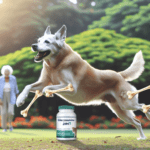
When you’re looking to support your dog’s joint health, selecting the right supplement can make a world of difference. As a responsible dog owner, it’s important to seek out high-quality ingredients like glucosamine and chondroitin, known for their cartilage-supporting benefits. Additionally, vitamins and fatty acids, such as omega-3s, are essential for maintaining healthy joints, skin, and coat. Consult with your veterinarian to ensure you’re choosing a product that meets your dog’s specific needs, whether they’re a young, active pup or a senior enjoying their golden years. Opt for supplements with the NASC quality seal to ensure you’re giving your furry companion the best for their overall well-being. Have you ever wondered what exactly you should be looking for in a dog joint supplement?
As a responsible dog owner, you obviously want to give your furry friend the best possible care. With so many products on the market, selecting the right joint supplement for your canine companion can feel overwhelming. But don’t worry, we’re here to help! This guide will cover all aspects to consider when choosing a joint supplement for your dog.

What Are Joint Supplements?
Joint supplements are dietary aids designed to help maintain and support your dog’s joint health. They can be particularly useful for dogs of all ages, whether it’s providing daily support for puppies or alleviating discomfort in senior dogs.
Why Is Joint Health Important for Dogs?
Before diving into what to look for in a joint supplement, it’s essential to understand why joint health is crucial. Just like humans, dogs rely on their joints for mobility. Healthy joints enable them to run, play, and live a full, happy life. Deteriorating joint health can lead to conditions such as arthritis, which can seriously affect their quality of life.
Signs Your Dog May Need Joint Supplements
It’s important to recognize when your dog might benefit from joint supplements. Some common signs to look out for include:
- Limping or lameness
- Difficulty standing or climbing stairs
- Reluctance to move or play
- Stiffness, especially after rest
- Noticeable discomfort
If you notice any of these signs, it might be time to consult your veterinarian about starting joint supplements.

Consulting Your Veterinarian
Before giving any new supplement to your dog, consult your veterinarian. Not only can they guide you on the right product, but they can also help rule out any potential underlying health issues.
Key Ingredients to Look for in Dog Joint Supplements
When shopping for a dog joint supplement, you’ll notice that many contain specific key ingredients known for their joint-supporting properties. Here’s a breakdown of what to look for on the label:
Glucosamine
Function: Glucosamine is a natural compound found in cartilage. It helps in the maintenance and repair of cartilage tissues and is often one of the primary ingredients in joint supplements.
Benefits:
- Promotes cartilage repair
- Reduces joint pain and inflammation
- Improves joint mobility
Chondroitin
Function: Chondroitin is another essential component of cartilage. It often works in tandem with glucosamine to help support joint health.
Benefits:
- Helps maintain the elasticity of cartilage
- Reduces joint pain and inflammation
- Inhibits cartilage breakdown
Omega-3 Fatty Acids
Function: Omega-3s are essential fatty acids known for their anti-inflammatory properties.
Benefits:
- Supports a normal inflammatory response
- Promotes healthy skin and coat
- Supports heart health
MSM (Methylsulfonylmethane)
Function: MSM is a sulfur-containing compound known for its anti-inflammatory benefits.
Benefits:
- Reduces inflammation
- Alleviates pain
- Supports connective tissue health
Hyaluronic Acid
Function: Hyaluronic acid is a component of synovial fluid, which lubricates the joints.
Benefits:
- Lubricates joints
- Reduces pain
- Supports joint health
Turmeric
Function: Turmeric contains curcumin, a powerful anti-inflammatory and antioxidant.
Benefits:
- Reduces inflammation
- Supports joint health
- Provides antioxidant benefits
Vitamin C and E
Function: Vitamins C and E are antioxidants that help to reduce oxidative stress.
Benefits:
- Promote overall health
- Support immune system
- Aid in collagen formation
Understanding Dosage and Form
Dosage
The correct dosage of any supplement is critical. Always follow the guidelines provided by your veterinarian or the product packaging. Dosage often depends on the dog’s weight, age, and health condition.
Forms of Supplements
Dog joint supplements come in various forms, including:
- Chews
- Tablets
- Powders
- Liquids
Each form has its pros and cons. For instance, chews are often more palatable and easier to administer, while powders can be mixed with food but might be less popular among finicky eaters.

Quality and Safety
Look for NASC Quality Seal
When choosing a joint supplement, always look for the NASC Quality Seal. The National Animal Supplement Council (NASC) ensures that products meet rigorous standards, from ingredient sourcing to manufacturing practices.
Ingredient Sourcing
Opt for supplements that use high-quality, natural ingredients. Organic and non-GMO ingredients are preferable for maintaining overall health.
Safety Standards and Certifications
Ensure that the product complies with safety standards and certifications, such as those provided by the American Veterinary Medical Association or other reputable organizations.
Other Health Benefits of Joint Supplements
While joint supplements primarily focus on joint health, they often offer additional benefits:
- Skin and Coat Health: Many joint supplements contain omega-3 fatty acids, which are excellent for the skin and coat.
- Oral Health: Some formulations include ingredients that support dental health.
- Overall Wellness: Antioxidants and vitamins included in these supplements also contribute to your dog’s overall health.
Age and Breed Considerations
Puppies and Young Dogs
Even young dogs can benefit from joint supplements, especially breeds prone to joint issues. Early supplementation can support healthy development and prevent future problems.
Senior Dogs
Senior dogs are often the primary candidates for joint supplements. These supplements can help alleviate the discomfort associated with aging joints and improve their quality of life.
Breed-Specific Needs
Certain breeds, such as Labrador Retrievers, German Shepherds, and Dachshunds, are more prone to joint issues. Breed-specific supplements are designed to address these unique needs.
Combining Supplements with Diet and Exercise
Diet
Ensure that your dog’s diet supports their joint health. Foods rich in protein, omega-3 fatty acids, and other essential nutrients will complement the benefits of joint supplements.
Exercise
Regular, moderate exercise helps maintain joint health. However, avoid high-impact activities that can exacerbate joint issues.
Popular Joint Supplements on the Market
Here’s a comparison table of some popular joint supplements:
| Supplement Brand | Key Ingredients | Form | Recommended For |
|---|---|---|---|
| Cosequin | Glucosamine, Chondroitin, MSM | Chewable Tablets | Older Dogs, Large Breeds |
| Nutramax Dasuquin | Glucosamine, Chondroitin, ASU | Soft Chews, Chewable Tablets | Dogs of All Ages |
| Zesty Paws | Glucosamine, Chondroitin, Omega-3 | Soft Chews | Young and Active Dogs |
| Vetz Petz’s Antinol | Omega-3 Fatty Acids | Capsules | Joint and Skin Health |
| VetriScience | Glucosamine, MSM, Perna Canaliculus | Chewable Tablets, Powder | Senior Dogs |
How to Introduce Joint Supplements to Your Dog
Introducing a new supplement to your dog’s diet should be done gradually to avoid any adverse reactions. Start with smaller doses and gradually increase to the recommended dosage. Observe your dog for any changes in behavior or health, and consult your veterinarian if you notice anything concerning.
Frequently Asked Questions (FAQs)
How long does it take to see results?
Results can vary depending on the dog and the supplement. Typically, it may take a few weeks to a few months to see noticeable improvements.
Can I give joint supplements to my pregnant dog?
Consult your veterinarian before giving any supplements to a pregnant or nursing dog. They can provide advice on what’s safe and beneficial for both the mother and her puppies.
Are there any side effects?
Most high-quality joint supplements have minimal side effects. However, some dogs might experience digestive issues like diarrhea or vomiting. Always consult your veterinarian before starting a new supplement.
Can I use joint supplements as a preventive measure?
Absolutely! Using joint supplements as a preventive measure for breeds prone to joint issues or active dogs can be highly beneficial.
Conclusion
Selecting the right joint supplement for your dog is an essential aspect of maintaining their overall health and well-being. By understanding the key ingredients, quality standards, and your dog’s specific needs, you can make an informed decision that will help support your furry friend’s joint health. Remember, always consult your veterinarian before introducing any new supplement to ensure it is safe and effective for your dog.
So the next time you’re pondering what to look for in a dog joint supplement, you’ll be well-equipped to make the best choice for your loyal companion. Happy wagging tails to healthier joints!







